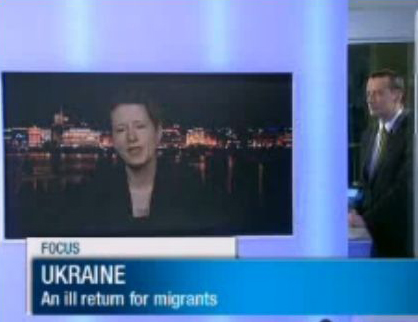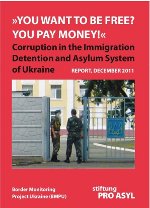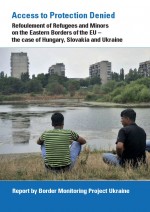 The numbers of migrants trying to cross into the EU from Ukraine appear to be falling, no doubt because EU assistance has reinforced Ukrainian border patrols. But an alarming report by Human Rights Watch suggests that ill-treatment of migrants on the Ukrainian side may also be part of the deterrent.
The numbers of migrants trying to cross into the EU from Ukraine appear to be falling, no doubt because EU assistance has reinforced Ukrainian border patrols. But an alarming report by Human Rights Watch suggests that ill-treatment of migrants on the Ukrainian side may also be part of the deterrent.
By Gulliver CRAGG
As Italy panics over an influx of migrants to its shores from North Africa, concern is also growing over the plight of those who try to enter the European Union by a different route: from the East, via Ukraine.
The former Soviet state borders EU members Poland, Hungary, Slovakia and Romania. Last year, more than 1,000 migrants were detained on those borders. Another 700 were returned to Ukraine from the EU, under a year-old agreement between Kiev and Brussels.
The numbers trying to cross appear to be falling, partly because EU assistance has reinforced Ukrainian border patrols. But an alarming report by Human Rights Watch suggests that ill-treatment of migrants on the Ukrainian side may also be part of the deterrent. Of 50 migrants interviewed for the report, says HRW’s Simone Troller, “half said they had been beaten, and eight reported electric-shock torture.”
The Ukrainian border service say eight officers suspected of ill-treatment have been fired or transferred, but they have yet to face further disciplinary action.
France 24 met a group of Somali migrants in Uzhgorod, nestled between the Hungarian and Slovakian borders in the far south-western corner of Ukraine. Somalis and Afghans form the largest national groups trying to reach the EU via Ukraine. Of those in Uzhgorod, some reported ill-treatment, others did not.
But all of them seemed to agree that Ukraine had nothing to offer them. “They have no chance of working, they have no chance of gaining refugee status, they have no rights and they are constantly hassled by the police, the border guard, the secret services”, says Natacha Kabatsi of the Medical Aid Committee, a local NGO.
Hassan, a 20-year-old Somali who lives in a small flat with five others, said that although he lived in fear of racist beatings, he understood why many Ukrainians feel their country should not have to bear the burden of helping refugees: “When I checked their history and their economy, I realised… they are suffering too”.
Migrants who are caught or sent back to Ukraine are first held for a week or so in temporary detention centres run by the border guard. The worst stories of ill-treatment come from these places. They are usually then either housed indefinitely in “temporary” accommodation centres, or released. In the latter case they have to obtain permits to remain in the country, of a duration of one to three weeks, and can often only do so with the help of a lawyer.
The accommodation centres have received funding from the EU, but due to changes to the Ukrainian system they have not received any state funds since the end of 2010. They are overcrowded and nutrition is poor. The most glaring lack, however, is that of any prospect for improvement in the migrants’ lot in the long term: “the system”, Kabatsi sums up simply, “does not work”.
Hassan agrees. “Here, our only opportunity is to stay and hear bad words, or worse. My only plan… is to try again to cross”. Fortress Europe’s assistance to Ukraine is clearly helping to make that harder to do. But the alternatives are much less clear…



